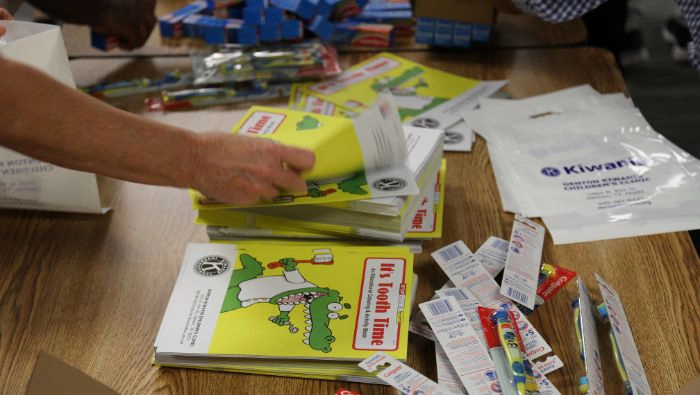
Why is everybody so angry?
From Twitter tirades and road rage to mall meltdowns and family feuds, the world seems angrier than ever.
Story by Julie Saetre
It all started with a seemingly innocent question posted on Nextdoor, a social media app that allows residents of neighborhoods to connect with each other for everything from lost-pet notices to recommendations for doctors and hair stylists.
“Can someone explain to me the appeal of (Pizzeria X, an often-praised local restaurant)? It was good, but it wasn’t amazing. What am I missing?”
The first three responses were benign: “We were also unimpressed. Try here instead.” “Pizzeria Y is my favorite.” “Pizzeria Z is better.”
But the fourth response came in hot: “What would have been TRULY AMAZING is if you would have taken the money you threw away (at Pizzeria X) and gave it to someone who can’t afford food for their children or pets.”
And another: “Why do you need to understand someone else’s taste? You can hate brussels sprouts and not need to know why someone else likes them. You can love cilantro and not need to know why someone else hates it. Learn what you like and stop worrying about what other people like.”
Suddenly, a flood of responses poured in. Angry responses. Posts about judgment. Posts about superior attitudes. About charitable donations. About self-proclaimed experts. The thread continued for hours, people heatedly arguing.
What was going on? This wasn’t a discussion about politics, the pandemic, religion or any of the other hot-button topics that dominate the news and social media. This was a discussion about pizza. Are people really so passionate about the combination of dough, sauce, cheese and toppings? Were they collectively just having a bad night? Or was there something else going on?
Why are people so angry? And is there anything we can do to make it better?
Laura Beth Moss is the founder of Growth Central Training and co-director of Growth Central, an organization that brings awareness to and education about anger, aggression and crisis. Moss teaches and trains therapists, social workers and counselors to work with court-mandated anger management clients. People arguing heatedly about pizza doesn’t surprise her — she once worked with a client who punched a hole in the wall after becoming angry over a partner leaving an empty tuna can on the kitchen counter twice in one week.
“Anything can be divisive these days,” she says. “What’s scary about our culture right now is we’re kind of getting addicted to divisiveness. It becomes part of identity.”
It’s something Ryan Martin sees as well. A professor of psychology, the associate dean for the College of Arts, Humanities and Social Sciences at the University of Wisconsin-Green Bay and the author of “Why We Get Mad: How to Use Your Anger for Positive Change,” Martin researches and writes on anger and the ways it is expressed.
“People can hide behind a screen on Nextdoor or Facebook. No one is held accountable. They can say what they want because they’re not face-to-face with people.”
“Some of what’s happening right now does feel like people are intentionally gearing up for a fight — that they’re out there wanting to engage in this aggressive way.”
Like anger itself, the answer to why so many of us are on edge is complex. One obvious reason involves one of everyone’s favorite targets, social media.
“Nothing is personal anymore,” says Elaine Parke, author of “The Habits of Unity: 12 Months to a Stronger America … one citizen at a time.” “People can hide behind a screen on Nextdoor or Facebook. No one is held accountable. They can say what they want because they’re not face-to-face with people. And it’s all been magnified by COVID, where we’re able to be together even less. We’re social beings, and the socialization has been stripped from us.”
The sources we turn to for news don’t always help. On 24/7 news channels, we’re more likely to see people arguing, talking over each other and slinging insults than we are to see a thoughtful discussion about the topic at hand.
“It’s just the model of how we see people disagreeing,” points out Tania Israel, a professor in the department of counseling, clinical and school psychology at the University of California, Santa Barbara, and the author of “Beyond Your Bubble: Dialogue Across Political Lines.” “What gets people to pay attention is conflict. So it’s not like it’s about people listening to each other in those conversations. It’s about people stating their views and not trying to come to any kind of compromise or understanding.”
We’re also living in a stressful, uncertain world, with conflict and turmoil swirling around political, health, social and cultural issues. The lingering pandemic, with its unpredictable ebbs, flows and sudden changes, throws more fuel onto an already robust fire.
“People are on edge,” says Martin. “They’re dealing with the stress of the pandemic. They’re dealing with the political division. And I don’t think people recognize how omnipresent that is.”
“So much of what we’re experiencing is an elevated baseline of anxiety — in our culture, in our individual lives and in our families,” Moss explains. “That’s the escalation that we’re seeing. Every time we go up a level, we stay there. Or we come down only half.
“When anxiety gets infused into a culture quickly,” she adds, “it doesn’t go away. It doesn’t get processed. It just becomes the new norm. And anxiety is fertile ground for a higher anger state.”
When we’re constantly anxious, we tend to be in a perpetual flight-or-fight state. In more primitive eras, this response system only kicked in when we needed to flee from a charging lion or defend our watering hole from a competing species. But with so much instability in our present world, we’re primed for action all the time — and that can lead to an elevated, angry response to just about anything.
“When animals are not in a fight for food or survival, they go back to a state of rest,” Moss says. “Animals are still doing this. Humans are not. We’re staying in the survival place. We’re accessing ancient circuitry meant to keep us alive when somebody cuts us off on the road, when our kid rolls their eyes at us. And that’s very dangerous.”
Acting on those angry emotions in person can lead to physical altercations, road rage incidents and other destructive confrontations, some resulting in injuries or deaths.
While online arguments with anonymous strangers don’t get physical, they are counterproductive, both to our health and the world at large. They add even more anxiety to our already stressed emotional state, and they’re not solving any of our conflicts.
One common mistake is to see something you disagree with online and to express your own view because you think the other person will be calmly persuaded.
”But that doesn’t happen,” Israel says. “In fact, the research shows that by sending somebody a contrasting opinion, you might be more likely to push them farther toward their extreme than bring them closer to where you are. And that’s not just in social media. That’s true in any of our interactions.”
There are a lot of factors outside our control. But while we might not be able to solve the world’s conflicts and anger issues, we don’t have to contribute to them either. Instead, we can learn to make our own lives, and those of the people around us, a bit more pleasant.
If you’re ready to turn down the volume on the anger in your life, it’s going to take a concerted, focused effort. Even anger-management professionals have to work at it.
“A lot of people assume because of what I do that I don’t get angry very often. That is not true,” says Martin. “I would put myself in the category of people who are really feeling frustrated right now by the world around me. For me, it’s about making intentional decisions about how I want to live my life, how I want to express that anger, what I want to do with it.”
Instead of firing off a heated response or hitting the gas to tailgate the person who cut you off in traffic, take a time out.
Moss asks her clients to practice what she calls the 30/30/30 response.
First, step away from the situation, physically and emotionally, for 30 seconds. Ease off the accelerator. Take a few steps back from the encounter. Put down your laptop. Remove yourself from whatever has angered you. Next, focus on taking deep, steady, calming breaths for 30 seconds. And for the final 30 seconds, do something that relaxes and destresses you — stretch into a yoga pose, recite a mantra, pet your dog or cat.
“The life of an emotion is about 90 seconds from start to rise to peak to fall,” Moss explains. “It’s very hard to identify anger unless you are really used to it. We don’t identify it until we’ve done something we regret. What we want to get skilled at is catching it on the way up and then creating an intervention.”
Once you’ve calmed down, you can make healthier choices. One of those choices, especially when you’re dealing with a stranger, is to do nothing at all.
The decision to disengage rather than escalating a situation might cost you some instant gratification. But you’ll gain the benefit of not adding to your stress level — and, in some cases, preventing harm to yourself or someone else.
If you find, after reflection, that your anger was the result of an injustice that needs to be resolved, you can use that emotion to help structure a solution.
“The life of an emotion is about 90 seconds from start to rise to peak to fall. It’s very hard to identify anger unless you are really used to it. We don’t identify it until we’ve done something we regret. What we want to get skilled at is catching it on the way up and then creating an intervention.”
“Channel it into appropriate assertiveness,” advises Martin. “You can channel it into art or music. You can write letters to the editor. You can (peacefully) protest. There are a lot of things we can do that are healthy.”
If your anger is directed at a person you know, however, or if their anger is directed at you, you’ll have to find a way to work through the situation. And to do that, you need to consider what you expect to get out of the exchange.
“I always ask people, ‘What are your goals? Why are you interested in reaching across the divide?’” Israel, the California-based professor, says. “And reliably, these are the things people tell me. They say, ‘There’s someone in my life who I want to maintain a connection with, and we’re having trouble doing that.’ Or they say, ‘I’d like to persuade or convince someone to see things the way I do.’ Some people say, ‘I want to heal the divide or find common ground.’ And then some people say, ‘I simply cannot understand how people can think or act or vote as they do.’”
Whatever your desired outcome, concentrate on dialogue, not debate. In a debate, an audience determines who presents the better argument.
“That’s not a good way to create a connection with somebody where there’s going to be understanding and warmth, which are the things that we really need in order to achieve any of the goals that we have,” says Israel.
She encourages you to enter that dialogue with curiosity about the other person’s viewpoint. You don’t have to share their outlook, but you can learn about the experiences that have shaped their opinion. And pay attention to what you hear.
“Give somebody space to express where they’re coming from,” Israel says. “When they do that, listen in such a way that you can summarize back to them what they said, rather than listening in such a way that you are crafting your rebuttal while they’re speaking.”
When you practice reflective listening, the other person will feel that you care enough to hear their thoughts, which encourages conversation rather than conflict. You’ll also get a better sense of their needs and concerns.
“What are the underlying themes of the content of this particular moment?” Ross asks. “Where does this person feel unseen, unheard? Where do they feel there’s an injustice in the world?”
When it’s your turn to speak, use that same mindset.
“Rather than sharing stats and slogans, try sharing a story,” Israel suggests. “Share more about how your views got shaped, rather than the research studies for what you believe. Share experiences that you have had or people who have influenced your views.
“People are interested in hearing stories about other people. We can really then create more of an understanding and connection, and even find commonalities or points of agreement.”
Remember, this isn’t about winning or losing; it’s about replacing an argument that escalates into anger with a dialogue that fosters understanding.
“There’s something to be said for just helping them acknowledge neither of you is right and neither of you is wrong — you just want different things in those moments,” Martin says. “And we have to think about how to ask for those things, how to politely tell each other that you want those things.”
It won’t just help you become less angry and anxious. It will model behavior that will help any children or young people in your lives to do the same.
“The control adults need to exhibit and have these days is really not so much control of the environment as it is self-control,” Moss stresses. “We have to show kids what it’s like to step away from this stuff, to be OK with that, to think that’s valuable.”
And that doesn’t just apply to angry encounters. It also means taking an occasional break from stimuli that we know provoke us. Turn off the news station. Take a time out from social media. Don’t read the comments on an article.
“You know the old saying, ‘We are what we eat’? Well, we’re also what we mentally consume,” says author Parke.
She encourages people to replace unhealthy mental consumption with habits that spread positivity. Her book and website (12habits4allofus.org) offer ways to focus on a different positive practice each month of the year. The January theme, for example, is “help others.” March is “resolve conflicts.” July is “become involved.”
“They’re just the things that have been forgotten,” she says. “And I’m hoping to bring them back.”
It’s all part of building a more compassionate, empathetic society. When that happens, anger fades.
“Empathy fixes everything,” Moss says. “It cures. It has power. When we’re able to see something from someone else’s point of view and understand the impact of that thing, whether it’s an organism, animal, another person — including ourselves — then we’re going to be more driven to fix it.”
This story originally appeared in the January/February 2022 issue of Kiwanis magazine.


